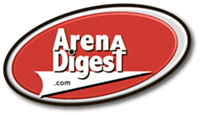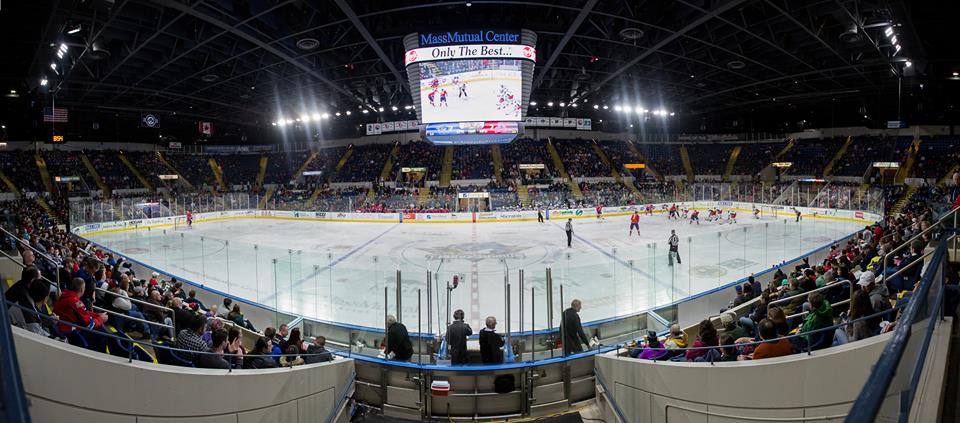In almost every way imaginable, Nathan Costa was the perfect man for the job. Born and raised in Springfield, MA, Costa cut his teeth in the American Hockey League by helping to establish a thriving ticket base in a city where there previously was none.
Returning to Springfield in 2009 after his successful three-year stint with the San Antonio Rampage, Costa took root inside AHL headquarters – near the MassMutual Center, where Springfield’s AHL team played – and became an expert in best practices for building fanbases across the league.
So, in 2016, when the Springfield Falcons moved to Tucson, a new iteration called the Springfield Thunderbirds took their place. In need of new leadership and new ideas — someone who understood Springfield and knew what it took to revive its dormant love for hockey — the AHL needn’t have looked any farther than its own cubicles.
“I had a blueprint that in my mind, I knew I was preparing for the next step of my career, which I was hopeful would be running my own franchise,” said Costa, who was named Springfield’s executive vice-president in June, 2016, and was promoted to team president last month. “The opportunity came along and we’re right across the street. We’ve had hockey in this city for over 80 years, so there’s something there. How do we dust it off and bring back the luster and what used to be the glory days of Springfield hockey? And that was really the mindset.”
The 2016-17 season was a renaissance for professional hockey in Springfield. The Thunderbirds didn’t even come into existence until May 2016, after the Falcons headed west and an ownership group led by local investor Paul Picknelly bought the Portland Pirates and moved them to the MassMutual Center.
In that pressure-packed summer, Costa and his staff were tasked with building the franchise and re-energizing the fan base. It was not until September, one month before the season opener, that the Thunderbirds unveiled their jersey designs.
“If you gave me the choice, I would do it with more time,” Costa deadpanned. “You just had to get going with the plan and I had that plan in the back of my mind for a long time.”
Costa’s management team not only survived, it thrived. Enacting best practices in ticket sales marketing, game-night presentation, and community involvement that Costa had spent years learning and honing, the result was one of the greatest sales turnarounds in league history.
The Thunderbirds averaged 4,664 in attendance in 2016-17, an over 50-percent increase from the Falcons’ league-worst average of 3,108 in 2015-16. The Thunderbirds enjoyed three sellouts at the MassMutual Center and nearly added a fourth in the season finale, drawing 6,217.
Advanced online ticket sales increased by more than $150,000 and the Thunderbirds are close to exceeding their number of first-year full season-ticket packages for the upcoming 2017-18 season.
At the AHL Marketing Meetings in June, Costa and the Thunderbirds took home awards for three major accomplishments: achieving a greater-than 10 percent increase in per-game full season equivalents, surpassing 10 percent growth in corporate cash sponsorships, and surpassing 15 percent growth in per-game group ticket sales revenue.
The recognition didn’t stop there. At the AHL Awards for Business Excellence, Springfield was recognized as Eastern Conference leader in revenue growth in overall ticket sales, season-ticket sales, group-ticket sales and corporate sponsorship sales. It was just the second time since the award program began in 2009 that one franchise swept the four categories.
“I always thought the city of Springfield was a prime opportunity,” Costa said. “This is a hockey market. People do love hockey in this market. I never thought it was getting the care and attention it needed when it came to what an AHL franchise can mean to a city the size of Springfield. It should be part of the fabric of what a city like Springfield is about. That was my goal, if we can intertwine ourselves into the real fabric of what this community is all about and do things different and present ourselves as a legitimate sports organization, then people would respond. It started with that. I had a plan in mind for what would be successful and it worked out.”
As if by fate, when the Falcons were sold and announced their move to Tucson, the solution for Springfield was just feet away. Their offices on the 24th floor of the Monarch Place Building in downtown Springfield, AHL headquarters had a critical neighbor one floor above. The day the Falcons announced their departure, Picknelly, the building’s owner, made the trek down one flight of stairs and put Springfield hockey on its brand-new path.
“When the opportunity came about I was in the [AHL] office when this call came down and it wasn’t a fun day when the Falcons were bolting,” Costa said. “The league didn’t know the city could have a team after that. [Picknelly] literally came down the stairs and met with [commissioner] Dave Andrews and said he’s very vested in Springfield and they didn’t want to see hockey gone. It just so happened that Portland was up for sale and looking to move, so that moved quickly. When I heard about that, I had a conversation with [Andrews], a mentor of mine, and I said, I think it’s time for me to run a franchise and what better than one in my backyard in the city I grew up in.”
In yet another way, Costa’s previous experience gave him a unique advantage toward successfully implementing his blueprint. While Costa learned sales and marketing techniques that proved critical to building a fan base in a non-traditional hockey city like San Antonio – introducing $1 beer Friday promotions and holding live concerts in the arena concourse to attract the non-hockey fan – his team was one of two others owned by the city’s NBA franchise.
And the AHL had taken an enormous cue from the NBA by utilizing the internal team consulting program known as TMBO – Team Marketing & Business Operations – that allows the league office to study and share sales and marketing best practices among its franchises, taking the best of one team’s approach and applying it to others in order to increase sales and revenue league-wide.
“We’re competing on the ice and they’re competing on the court, but off the ice we’re not competing,” Costa said. “The NBA was one of the first to agree to share their financial data with each other, to share best practices and what was working. Andrews recognized we could do something similar. We were one of the only other leagues that agreed to share all financial information from the revenue side. It’s all under strict confidentiality with each other.
“It allowed us at the league level to identify teams that were having success and to go to those teams and see exactly what was happening. We found it was the focus on game-night experience. All these teams that were really high-performing from a business perspective were focused on game-night experience and selling tickets. The focus was on group experiences, getting kids and families involved in what was happening on a game night on a daily basis.”
During his time at AHL headquarters, Costa immersed himself in TMBO research for the league, and was then able to take those lessons learned across the street to the MassMutual Center.
“The main focus for me was four areas: Sales, marketing, game presentation and community involvement. The ticket sales team is really what drives the boat. That’s where the focus has to be. Getting outbound, having conversations, talking to people who have been at the building, getting groups sold, and that was my background and expertise. So, I felt comfortable coming into that and setting expectations.
“The previous organization had one ticket price for the entire arena. Coming from my background, I had the seating map configurations for 29 other arenas around the league. I could pick and choose and take from some of the best and see what we could do, what our pricing structure should be, and all of that was bred from what we did in team business services. To have all that info and use it to my advantage was great. We wouldn’t have been able to do what we did last year without that focus on sales and making that a huge part of that business.”
Costa and his staff blitzed the Springfield area with light-post banners heralding the arrival of the Thunderbirds. The team launched TV, radio and social media campaigns to get the word out.
“Previous organizations didn’t spend much on advertising and almost zero on digital,” Costa said. “We completely reversed that. Most of my spending is on digital and creating a brand on social media. Then also tying into the promotions and always promoting the new thing we were trying to do, so people were hearing and seeing us. If you come to downtown Springfield, we’re everywhere. It makes an impact, especially in a market where they’re not used to seeing any of it at all.”
Most of all, Costa focused on all the things that make a modern hockey franchise successful, even if that doesn’t necessarily include the product on the ice.
“It’s so hard to sell the sport at our level,” Costa said. “We’re no longer competing with other professional sports teams. We’re competing with the entertainment dollar. That’s what AHL teams do so well, because they understand that from a business perspective.
“It’s all about the game-night experience. And oh, by the way, while you’re here, with all the great concessions and promotions going on, there’s also some hockey happening on the ice. You have to have a way to get the people who aren’t exactly hockey fans out to the building. So that was the vision last season and continuing forward. How can we make the MassMutual Center the place to be, the place to be seen and the place to have a great time and help our team win a Calder Cup?
“We knew it was going to be hard work. You can have a vision and do all that stuff, but if you don’t have the staff enacting that vision, it doesn’t work. You have to grind and pound the rock, because it doesn’t happen overnight. Last year there were challenges. It’s got to be done in a slow way. It takes time to properly grow a fan base back up again. And I’ve been very proud of how our group has stuck to the game plan and we’re continuing to slowly build here.”
Image of MassMutual Center courtesy Springfield Thunderbirds.
This article originally appeared in the weekly Arena Digest newsletter. Are you a subscriber? Click here to sign up for the free weekly newsletter


